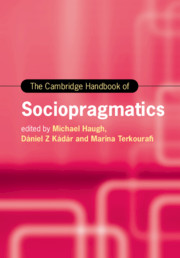Book contents
- The Cambridge Handbook of Sociopragmatics
- Cambridge Handbooks in Language and Linguistics
- The Cambridge Handbook of Sociopragmatics
- Copyright page
- Contents
- Figures
- Tables
- Contributors
- Acknowledgements
- 1 Introduction
- Part I Fundamentals of Sociopragmatics
- Part II Topics and Settings in Sociopragmatics
- 13 Face, Facework and Face-Threatening Acts
- 14 Relationships and Relating
- 15 Analysing Identity
- 16 (Im)politeness and Sociopragmatics
- 17 Affect and Emotion
- 18 Power
- 19 Morality in Sociopragmatics
- 20 Conversational Humour
- 21 Gesture and Prosody in Multimodal Communication
- 22 Digitally Mediated Communication
- 23 Workplace and Institutional Discourse
- 24 Service Encounter Discourse
- 25 Argumentative, Political and Legal Discourse
- 26 The Pragmatics of Translation
- Part III Approaches and Methods in Sociopragmatics
- Index
- References
16 - (Im)politeness and Sociopragmatics
from Part II - Topics and Settings in Sociopragmatics
Published online by Cambridge University Press: 01 April 2021
- The Cambridge Handbook of Sociopragmatics
- Cambridge Handbooks in Language and Linguistics
- The Cambridge Handbook of Sociopragmatics
- Copyright page
- Contents
- Figures
- Tables
- Contributors
- Acknowledgements
- 1 Introduction
- Part I Fundamentals of Sociopragmatics
- Part II Topics and Settings in Sociopragmatics
- 13 Face, Facework and Face-Threatening Acts
- 14 Relationships and Relating
- 15 Analysing Identity
- 16 (Im)politeness and Sociopragmatics
- 17 Affect and Emotion
- 18 Power
- 19 Morality in Sociopragmatics
- 20 Conversational Humour
- 21 Gesture and Prosody in Multimodal Communication
- 22 Digitally Mediated Communication
- 23 Workplace and Institutional Discourse
- 24 Service Encounter Discourse
- 25 Argumentative, Political and Legal Discourse
- 26 The Pragmatics of Translation
- Part III Approaches and Methods in Sociopragmatics
- Index
- References
Summary
Politeness and sociopragmatics have long been aligned since they were first proposed as areas for serious scholarly research but have since also grown into large, diffuse areas of research in their own right. The aim of this chapter is to consider synergies between these two areas of research. The chapter begins by reviewing the roots of connections between sociopragmatics and (im)politeness before briefly overviewing (im)politeness theories and the role that the first/second-order distinction can play in distinguishing between different approaches in the field. We then discuss some key sociopragmatic concepts that have come to play an important role in (im)politeness research, including context, strategies, indirectness and norms. This leads into a case study of offence-taking that illustrates how sociopragmatics and (im)politeness research now have a much broader scope, both methodological and theoretically, than earlier analyses that tended to focus on the politeness values of single utterances. We conclude by considering some of the key issues that will likely shape ongoing development of (im)politeness research, including the role of interdisciplinarity, the use of a greater range of data types and methods and the increasing need for systematic meta-theorization in the field.
- Type
- Chapter
- Information
- The Cambridge Handbook of Sociopragmatics , pp. 315 - 339Publisher: Cambridge University PressPrint publication year: 2021
References
- 9
- Cited by



